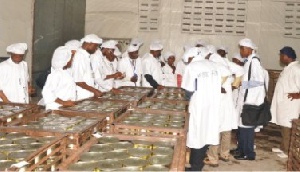The diversion of imported goods by Free Zones entities for local consumption has become a “conduit for defrauding the state”, the Ghana Revenue Authority (GRA) has said.
“They [Free Zones] have become a conduit for defrauding the state. There is so much diversion,” said Mr. Robert N. Mensah, Chief Collector, Client Service, GRA Customs Headquarters.
He was speaking at a Customs Regimes education seminar organised by the GRA in Accra.
A Free Zone is an isolated area, building or place within a country considered by law to be outside the customs territory of that country.
Companies in a Free Zone enjoy total exemption from payment of direct and indirect duties and levies on all imports for production as well as their own exports. They also enjoy minimal customs formalities and no import licencing requirements.
The Free Zones form one of the various international Customs Regimes known as a Suspense Regime. This system allows imported goods to undergo processing or further treatment for eventual re-exportation.
In Ghana, 70 percent of the annual production of goods and services by Free Zones enterprises are for export, while 30 percent are authorised for sale in the local market.
However, the absence of laws that restrict the type and quantity of imported goods into the Free Zones enclave has led to underhand dealings, whereby Free Zones enterprises use their status to import goods and divert them to be sold on the local market, according to the GRA.
“Some form of restriction should be introduced to what is imported into the Free Zones. [We need] an exhaustive list indicating what goods can be imported into the Free Zones.
This should be done so as not to kill local initiative and encourage the indigenous entrepreneur,” said Mrs. Sharon Quaye, Collector, GRA Customs, who is the officer in charge of the duty-free diplomatic shop.
She said the unbridled importation of goods by Free Zone entities is a threat to local businesses. “Some imports such as traditionally made bags and artefacts do not augur well for the growth of indigenous business in our country.”
Companies in the Free Zones enclave in Ghana are involved in activities such as cocoa and wood processing, fruit processing, production of petroleum products, and call-centre services.
Another issue that came to the fore at the seminar is the need to upgrade existing port facilities and construct more warehouses around the seaports to enable Ghana beat competition from Côte D’Ivoire, Togo, Benin and Senegal for landlocked cargoes.
This is crucial as transitors need a lot of time to organise transportation of their cargoes to consignees in the landlocked states.
“Due to the numerous benefits of transit trade to the transit countries, many of these countries are keenly competing for the landlocked country cargoes,” Mrs. Quaye said.
Business News of Monday, 19 November 2012
Source: thebftonline
Free Zone companies incriminated
Entertainment












